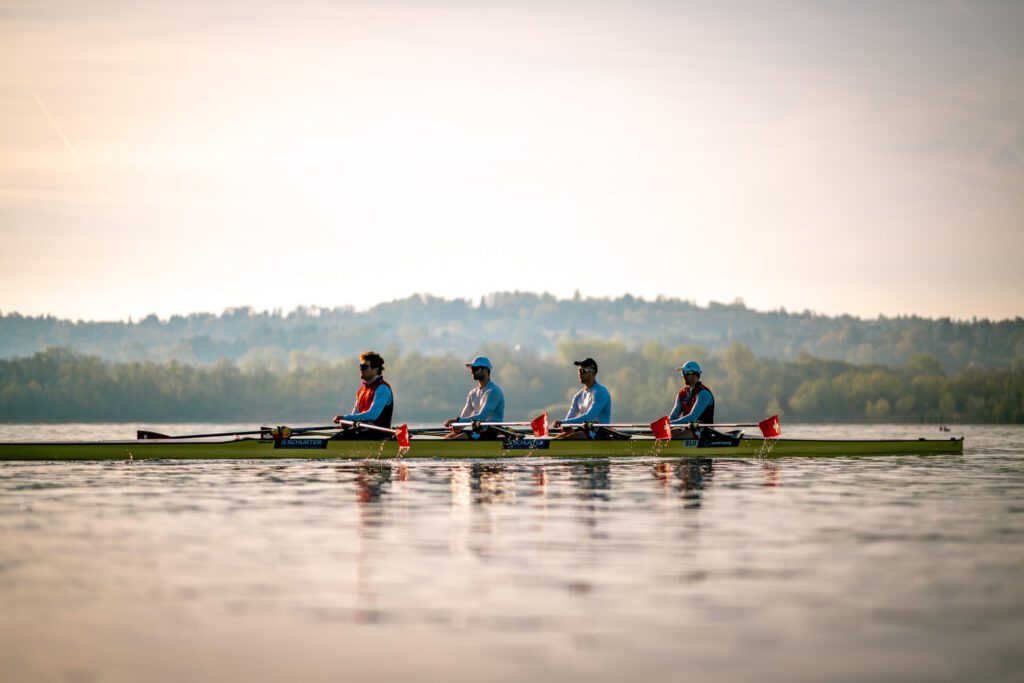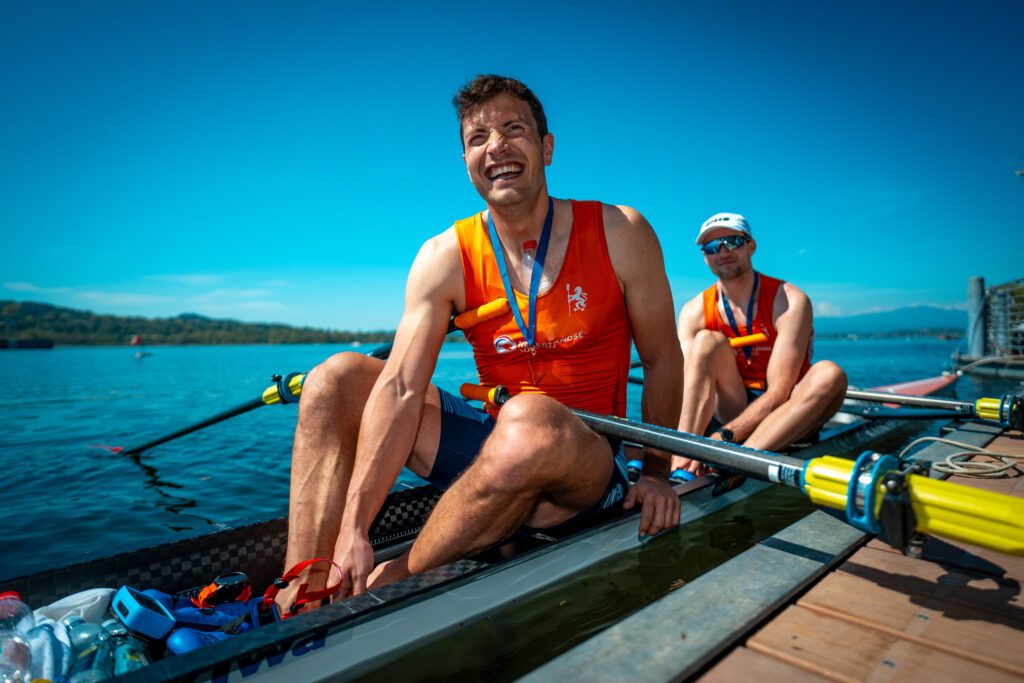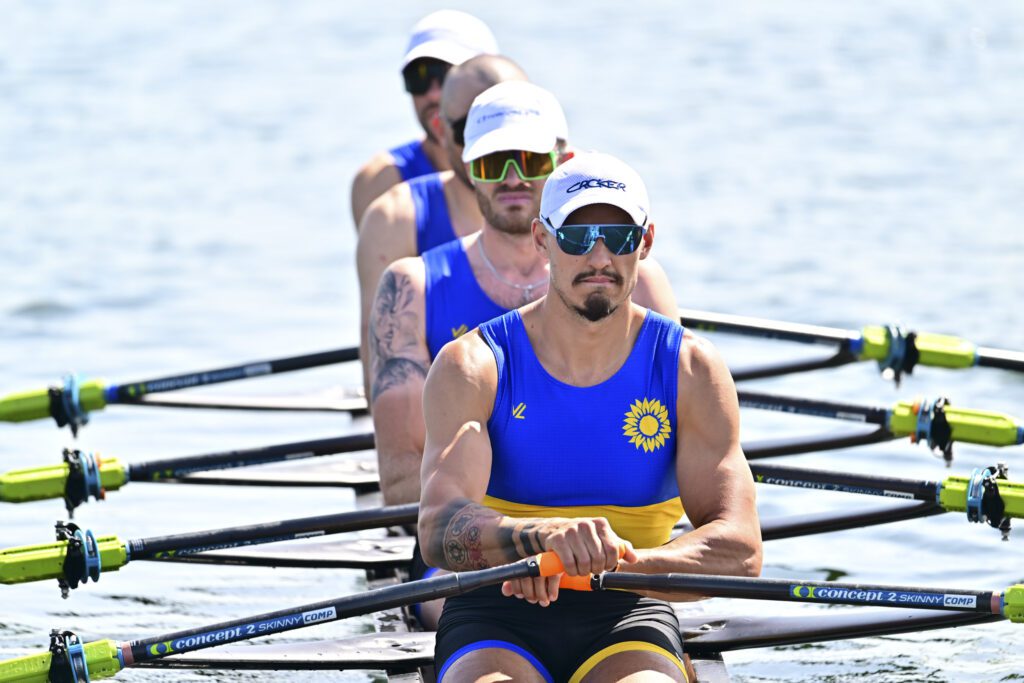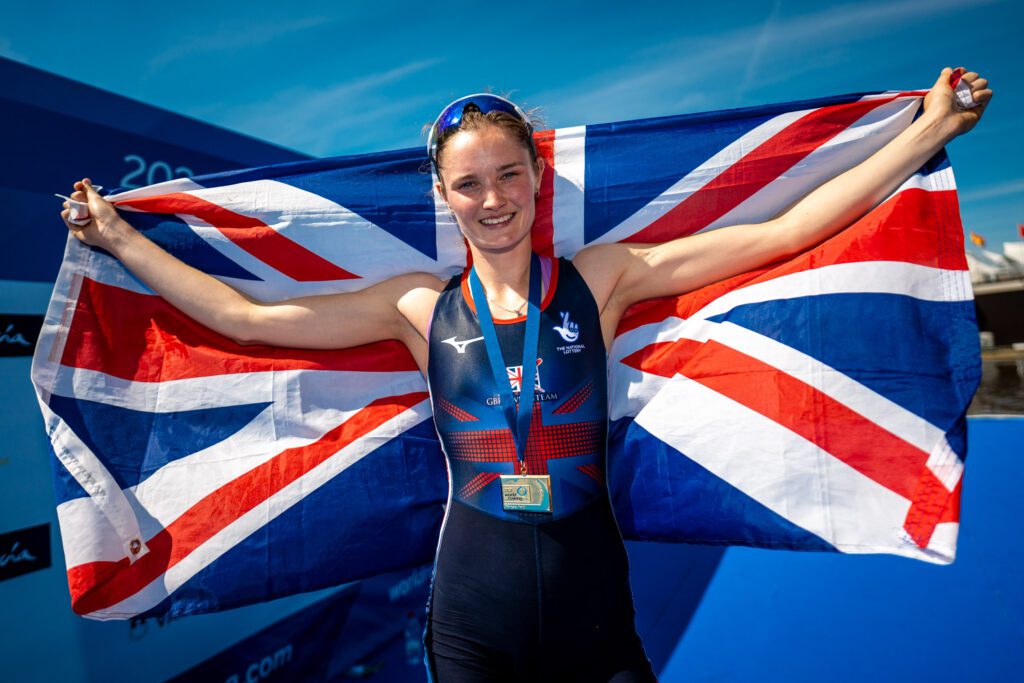The steady increase in COVID cases in the Dutch team at the Tokyo Games — now six including sculler Finn Florijn, women’s rowing chief coach Josy Verdonkschot and another unnamed rowing team staff member — has led to an unpleasant situation at the Sea Forest Waterway where on Monday Dutch rowers reported being ostracised by other teams. It led to World Rowing feeling the need to put out a statement on Twitter about it, late in the afternoon once crews had finished training on an unexpectedly calm-weather day.
“The Netherlands Rowing Team has reported that none of the rowing team members was judged to be a close contact to any of the three positive cases experienced in the past few days”, said the first tweet. “According to the COVID-19 measures announced by the IOC and Japanese authorities, they are no longer required by the rules to be isolated from the other stakeholders. All of the team members tested negative yesterday.” Then one extra point: “As a precaution and out of respect for the other stakeholders, NED, OC and WR agreed that the Netherlands [rowing] team members will continue to separate themselves from other teams and individuals.”
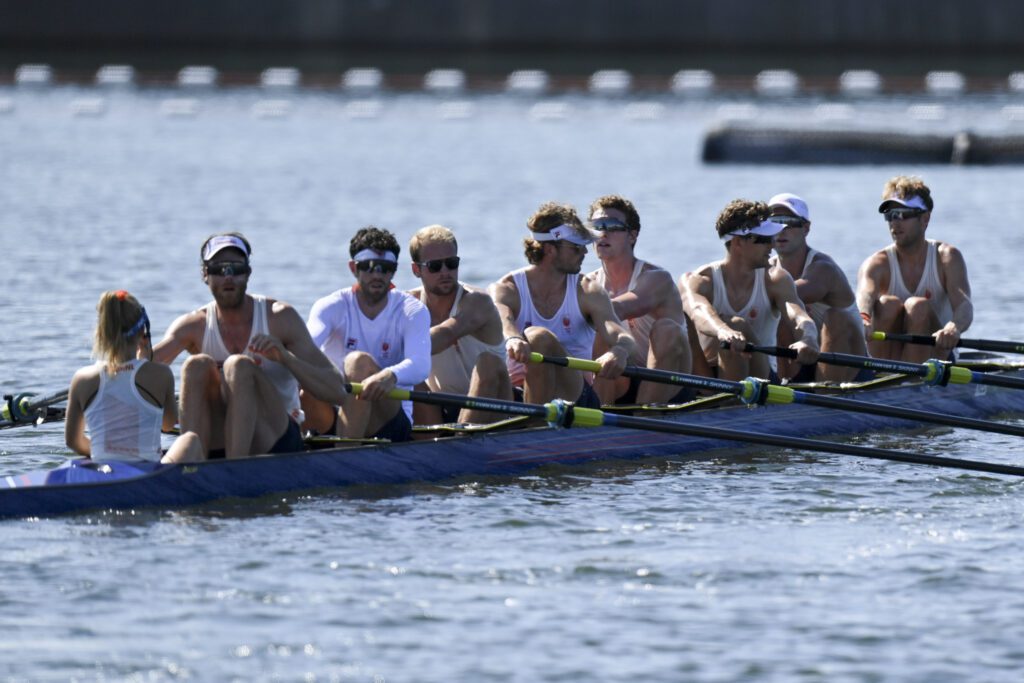
Photo NED M8+ training at the Sea Forest Waterway in Tokyo on Sunday
So far so reasonable, but later Dutch broadcasting website NOS reported that “the Orange rowers are no longer welcome in the dining hall and the area that has been arranged for the [land] warm-up.” It went on to describe the Dutch rowers as having to prepare for races in a 4x4m tent, with only enough room for a few bikes and ergs, while at lunch they eat separately or back at the Olympic Village. “The organisation has also asked the Dutch to stop using bus transportation between the Olympic Village and the rowing course. An assistant national coach of the rowers already said that if he is in his orange team outfit in the bus, nobody else wants to get in. The rowers now travel in cabs and small vans, but these actually have to be booked 48 hours in advance and that is difficult to organise.” Further animosity was apparently created after national rowing federation KNRB decided to try to keep the name of the third Dutch rowing case anonymous, enraging other nations. NED W4x member Olivia van Rooijen was fetching blades from the boathouse when an Australian coach started shouting ‘Out! Out!’ at her, an upsetting incident. “We are in a form of isolation, where we all try to make the best of it”, said NED rowing technical director Hessel Evertse.
WEATHER WOES
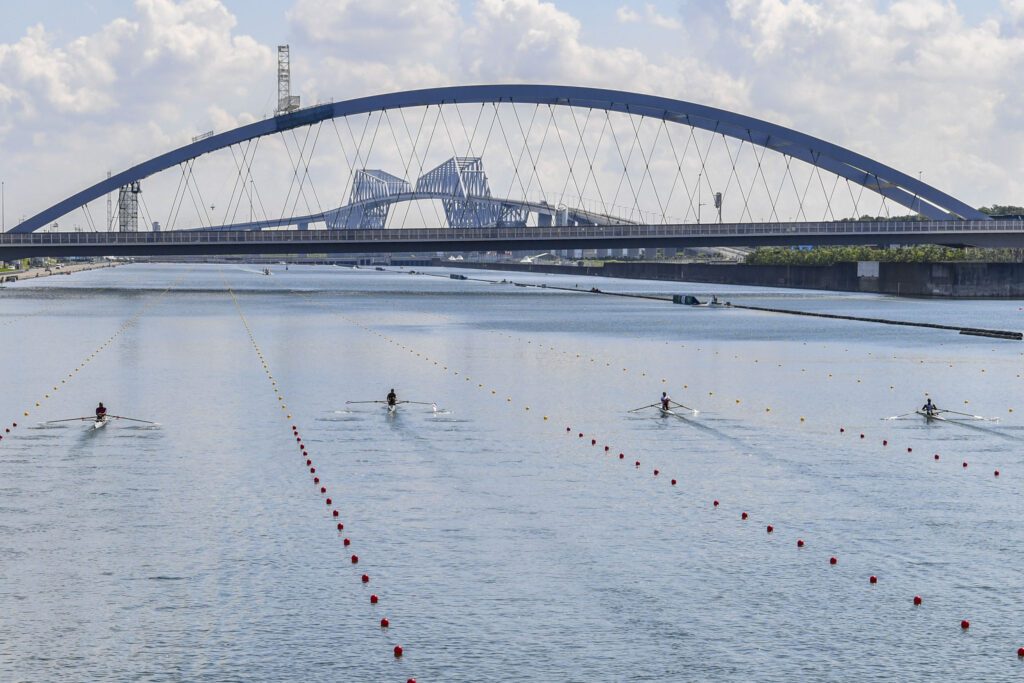
Photo Calm conditions at the Tokyo 2020 Olympic rowing venue on Sunday
FISA’s precautionary schedule changes started to look over-cautious on Monday, as the changeable coastal weather shifted yet again. The expected storm, original described as a tornado, is now set to be a minor tropical storm, and may well avoid racing hours entirely. The course was open for training all Monday, with no difficult conditions, and may well be open again on Tuesday, though that decision will be taken late. So FISA fingers are now being crossed that the slow-moving storm will not trail into Wednesday and ruin the plans made for the first medal finals that day, the men’s and women’s quads.
CHAIRMAN ROW
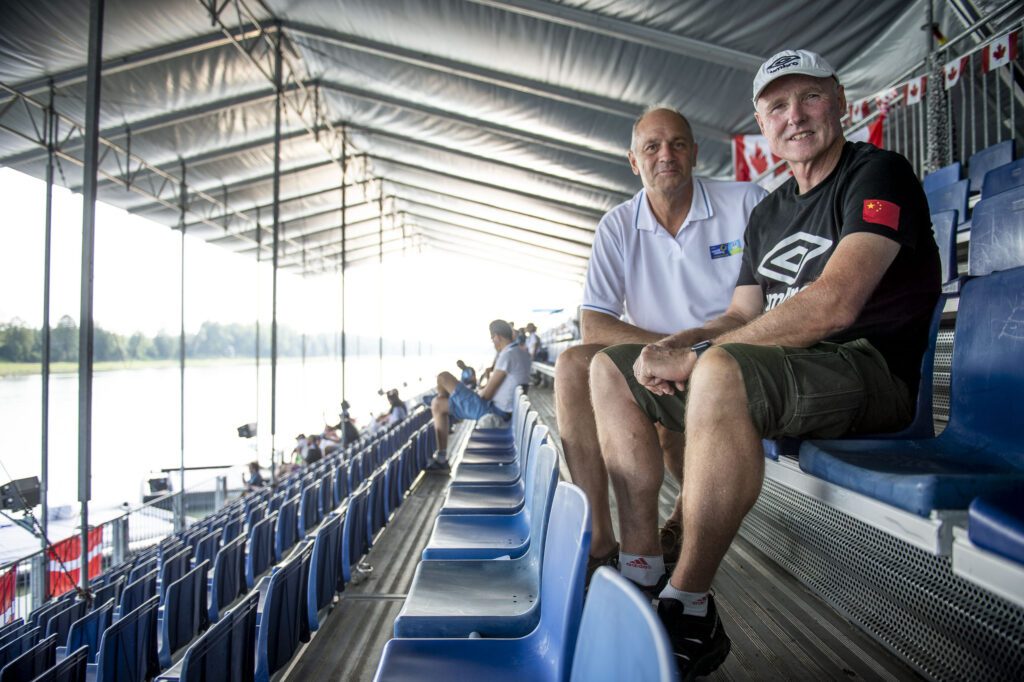
Photo Steve Redgrave (left) with CHN Chief Coach Paul Thompson
Credit Benedict Tufnell
Three years ago Sir Steve Redgrave became performance director for the Chinese rowing team. It is not much of a secret that he would have liked to do the job for Britain after Sir David Tanner retired six months before that, but it was China who wanted him, and so began a new phase in the life of the most famous rower in history. Although rather a good coach (I speak from personal experience), he had not been either a coach or director of rowing for any length of time until that point. The job would take him away from friends and family to the other side of the world but pre-pandemic the plan was for the Chinese team to train in Europe for the early racing season, so that trips back to Marlow would be easy. His wife, Dr Ann Redgrave, has been the medical officer to the GB rowing team for many years and travels to regattas with them.
When the pandemic began to hit Europe in spring 2020 the Chinese team were already at their Spanish training base. “The team flew back to China”, says Redgrave, “ and being a diabetic, they gave me the option to go home for a few days to wait until we knew what was happening. In those few days China closed its borders and I couldn’t get back in until September.” After a summer in the UK, he returned to China and then got stuck again, this time on a different continent. Until eight Chinese crews flew to Lucerne for qualification this May, he had not seen family for many months. “That was a bit odd when I saw Ann for the first time walking down to the [Lucerne] regatta site. You’ve been married for 33 years and you meet up with somebody you’re supposed to live with and you aren’t allowed to touch them. Leaving Lucerne was probably harder than leaving the first time.”
Redgrave’s goal for China here is to win either one gold, or two medals. “China have only ever won one Olympic [rowing] gold medal before, and that was on home water”, he explains. “So to win one away from home, that would be a step forward. We’ve won two Olympic medals before two or three times, so if we come away with two medals, one an away gold, that is a big step forward.” He feels his team have so far performed as expected. “We knew we had two really slow boats and they proved that by being the first ones to be eliminated (W2x and M2-). No more racing for them. The women’s quad looks very dominant, it’s theirs to lose. The men’s double we know there’s always been 4-5 boats that could potentially win. One of them now isn’t in the final, fortunately we are. The women’s eight had to go through qualifiers after a very late change from our point of view, and they’re still in the mix. They want to win.”
But if the extra day for racing ends up being used, Redgrave might miss his eight’s performance. “I’m going back to the UK on Saturday, whatever happens. My flight’s in the afternoon.” The reason is Henley Royal Regatta, of which he has been the highly active Chairman since December 2014. Although vaccinated three times now, none of them are recognised under UK government rules, as they were not administered by the NHS. So Redgrave has to allow for quarantine, even including test-to-release, in order to be ready to run his regatta under the most unusual and complex conditions ever seen. He has five weeks off from China, of which two will be taken up with HRR, and then is back to Asia for September, ready to start the planning and training towards Paris 2024.
Henley Royal 2021 runs from Wednesday 11th to Sunday 15th August inclusive, but the changes begin several days before that. Qualifying races have been moved to Saturday 7th daytime rather than Friday afternoon, and will take place at Dorney Lake. “It’s a balance, safety for everyone involved — spectators, media, guests, athletes, members — and that’s why we’ve chosen to do the qualifiers at Dorney”, says Redgrave. “It’s a secure site and so if we got closed down completely, we could have done a regatta there behind closed doors. We didn’t want to do that, we never publicised it, but we have four days in the diary so people can train there. We aren’t opening our site for boating at all [until racing].” So from 5th-8th August HRR crews can train at Dorney, whose staff are accustomed to COVID-secure events, and then they will be allowed to move to Fawley Meadows — this year’s site of the boat tents — under supervision. “We’ll be controlling space all the time”, says Redgrave. “If they go to somebody else – Upper Thames, Leander or whatever – but I don’t think they will. We can’t close the river, it isn’t our river to close unfortunately, we can only control the bits we’ve got.”
“As an event, we’re trying to keep our integrity, we’re trying to keep our event as safe as we possibly can, and putting on an event for everybody that loves it.”
Sir Steve Redgrave, Chairman HRR
On the Berkshire bank, the boat tents have turned into a parking-and-picnic area which will be called the Spectators’ Lawn, and the Stewards’ Enclosure has been enlarged to include the space normally taken by the Regatta Enclosure, which has been removed. So competitors will not be allowed into the enclosures unless they are also members of Stewards, and in any case will be heavily discouraged from walking over the bridge once their racing has finished. Nor are the usual Copas Farm festivities taking place. “They’re setting up the Rewind Festival, so they’re not doing very much at all [for HRR], they’re scaled down”, says Redgrave. “Remenham [Club] are scaled down, Leander as well, I’m not quite sure about Upper Thames. Everyone’s in a strange situation.” Athletes are being encouraged, as per British Rowing guidelines, to do daily lateral flow tests to keep a lid on the number of possible cases.
Dropping TV was considered, since though not the biggest cost it is a huge annual expense. But viewers will be pleased to hear that the Stewards have gone with maintaining the coverage, knowing that might be the only way many would see racing. The bigger expense, that of printing and mailing out all the cardboard guest badges, has been ditched for COVID, with metal members’ badges going out much earlier in the year. “We’ve gone for [guest] wristbands this year, and there is a slight restriction on what there would normally be”, says Redgrave, after taking the decision that members would need to apply for the limited number of guest bands available. “There are no guest badges on sale at the moment, as a member you have to register to collect what badges you would pick, and don’t just take them. If you aren’t going to use them, we can sell them, and actually that’s where we make our money. People coming eating and drinking and selling guest badges. All that’s been scaled down, so that’s the financial hit we’ll be taking.”
Money is often on his mind, not least because the televising of the regatta has been expensive. “Although charity is a big part of my DNA, since I’ve been Chairman we haven’t donated to the Henley Stewards’ Charitable Trust, because the TV took all that.” Redgrave is also starting to empathise with the less affluent members. “I’m sixty in a few months time, and with ageing membership it becomes quite a struggle for some people. You’ve got to balance that whole thing up: some people think [membership] is very expensive and some think it’s dirt cheap.”
One event for which TV will be not only essential but also updated is the draw, which won’t take place in the Henley Town Hall for what he believes is the very first time. Instead it will be done in HRR Headquarters by the bridge, using a system devised but never used last year, and live-streamed by Sunset & Vine, their TV partners. “We’re going to broadcast it live on Sunday [8th August] morning. Still using the Grand [Challenge Cup], but instead of our pieces of paper, we’ve got plastic discs which now go in. They’re almost like poker chips with the HRR crest on. Each one will be put into the Grand Challenge Cup and if everything comes together the camera will be focused on the top of the cup. You’ll see my hand going in, see them each coming out.”
He has also had to ban row-pasts this year, and of course last year’s Regatta was cancelled. “So next year we’ll have three years of row-pasts, which is difficult. But it will be six days [in 2022] so maybe we’ll just have a day of row-pasts!” 2021 is the 40th anniversary of his and Eric Sims’ doubles win, which was Redgrave’s first ever little red medal box. “We were going to row up the course in the boat we raced in, which is in his back garden.” And 2022 is the 40th anniversary of the red-hot Double Sculls record Redgrave set with Adam Clift in the same shell, a record which lasted for decades. Redgrave sees these moments differently now, having turned down the chance to do a 25-year reunion with his 1984 Olympic gold medal M4+ in 2009, thinking that the 30th anniversary would be soon enough. A year later Andy Holmes from the crew, with whom Redgrave had later won two more Olympic medals, tragically died after contracting Weil’s disease while coaching on the Tideway. “We will never have the chance now”, says Redgrave. “It’s the camaraderie, what the Stewards’ Enclosure is all about. It’s such a special environment, our sport is. We’ve all come from the same roots.”
Mind you, row-pasts are getting more difficult lately. Despite looking the picture of health, Redgrave now has arthritis in his wrists (“I can’t feather”) and some time ago developed Dupuytren’s Contracture in his left hand, a syndrome in which hard nodules develop under the skin of the palm, forcing the fingers to contract until they cannot fully open. He had repeated surgery, which hasn’t entirely been successful, and his hand is a web of surgery scars. Redgrave is right-handed but says “it’s amazing how much you use your left hand”. But he is resilient, and always has been. He can get annoyed when situations are unfair, but he’s rarely fazed for long by problems.
In a time of pandemic, Redgrave and his Stewards have steered the Royal Regatta to a point where something can take place, and there are 488 or so entries, including a tiny number of overseas crews. “There are two boats I know are here at the Olympics, and a number of athletes that are planning to race with their clubs. If they race, that is. As an event, we’re trying to keep our integrity, we’re trying to keep our event as safe as we possibly can, and putting on an event for everybody that loves it.”
